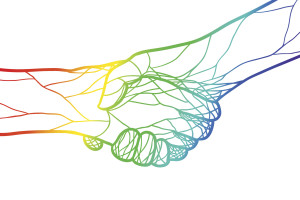
Traditionally, when you think of an ally, you might think in terms of countries coming together for a military or other purpose. During World War II, there was a group of countries that banded together to oppose the Axis powers of Germany, Italy and Japan that were called the Allies. The U.S., England, the Soviet Union and France were the four strongest nations of the Allies, but China, Canada, Denmark, South Africa, Australia and many others joined the cause. Together, the militaries of the Allies did defeat the Axis powers to prevent government takeovers.
Today, when we think of an ally, we think of someone who supports another and stands up for someone’s rights. In the LGBT community, allies are those who are not LGBT but want everyone to enjoy liberty and freedom to live. The Gay, Lesbian and Straight Education Network (GLSEN, pronounced glisten) dedicates the week of September 26 as Ally Week for LGBT youth to prevent bullying, harassment and name-calling.
Creating Safe Spaces in Schools
Allies of the LGBT community have to advocate for all individuals without speaking over or for them. One of the best things to do is to reflect on how to be an ally. GLSEN offers a number of suggestions for being an ally:
- Be intentional on becoming an ally to LGBT and other vulnerable youth.
- Explore what being an ally means.
- Intervene when you hear or see anti-LGBT language.
- Don’t presume when speaking about LGBT issues. Use “I” statements to speak from your own experience.
- Ask your LGBT friends how you can support them.
- Practice talking to your LGBT friends without demanding information about their experiences.
- Don’t assume anything about a person based on looks or who he or she hangs out with.
Within your school or community:
- Create or join a Gay-Straight Alliance. GLSEN has many resources for building a club within the school to be an ally with LGBT students.
- Share stories about being an ally or when you couldn’t find one.
- Write an editorial to your school newspaper or even community newspaper about allyship and how important it is.
- Hold workshops to help others understand being an ally.
- Create a bulletin board display at school that outlines how LGBT youth can be supported.
- Examine your school’s student bill of rights to ensure that it is inclusive. If not, talk to administrators to make changes for a safe school.
- Always be respectful when speaking to teachers and administrators even when you come up against resistance.
- Talk to your school advisors about making sure that the school has LGBT-inclusive resources.
Learning to Move Forward
Teaching youth to be engaged in solving social injustices in schools gives them the tools to engage in their communities once they’re out of school. It takes people of all kinds to ensure that the LGBT community has the same rights as everyone else. Allies are important to the movement. Schools are not the only place where individuals need to be safe. Ally Week has to be taken out into the community where people live.
Change is possible. The Obergefell case proved that the Constitution demands equal rights for the LGBT community, but there is still resistance in some parts of the country. No one can become complacent as an ally, because it’s too easy to marginalize people who are in the minority.
Peer support greatly increases self-esteem and personal attitudes. A feeling of isolation often leads to depression and suicide. Youth are very vulnerable when they’re being bullied or harassed. Allies are needed to give support and change awareness. School has to be a safe place for students of all kinds to get an education and become the adults they are meant to be. Become an ally today.

